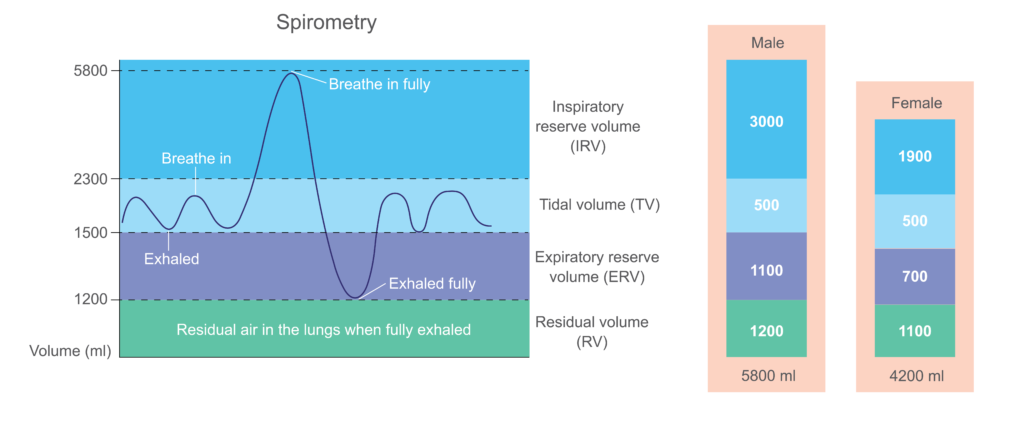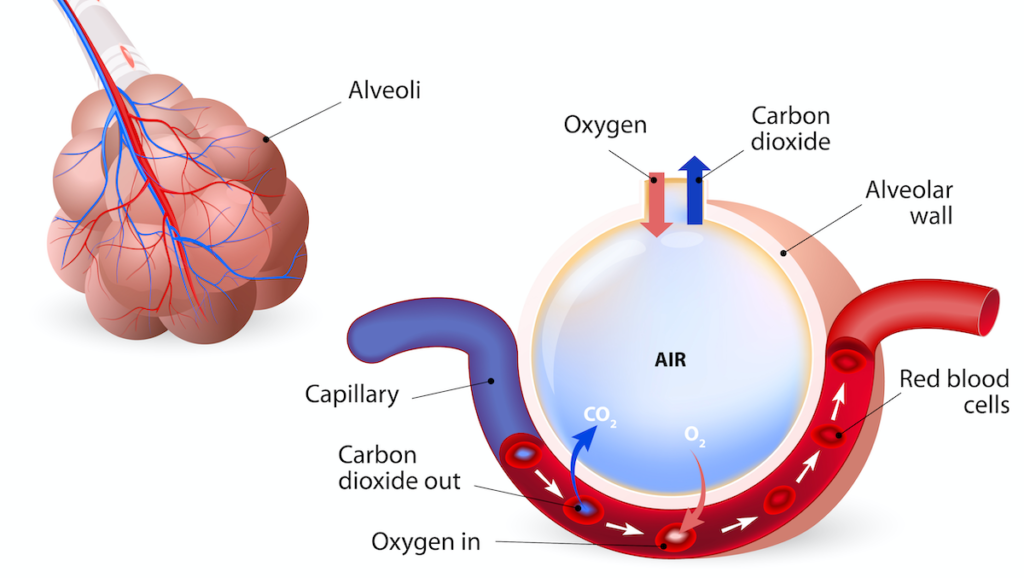I’ve often heard yoga teachers say things like, “We only use a small percentage of our lungs when we’re breathing normally,” or “We don’t use our full lung capacity, and if we could breathe more deeply, we could bring more oxygen into the bloodstream.” But are those things true?
Well, it is true that if you’re breathing quietly, you don’t use the full volume of your lungs.
Lung volumes
Total lung volume is usually said to be about six liters, although that’s based on your size. An average sized young man’s lungs would be around that figure. Women typically have somewhat smaller lung volumes.

During normal, quiet breathing, you don’t fill nearly that full volume. A typical quiet breath is only about 500 milliliters, or half a liter, which is referred to as the tidal volume. That means that there is a lot of extra volume available to fill, which is called the inspiratory reserve volume. At the end of a tidal volume exhalation, there’s also more air left in the lungs that you could breathe out, referred to as the expiratory reserve volume. Even at the end of the deepest exhalation, some air is left in the lungs. That’s called the residual volume.
So there’s a lot of extra space in the lungs that you could use. That’s a good thing. It means that you have extra capacity available when you need it—for instance, when you’re exercising.
Oxygen saturation
So, does breathing in more deeply oxygenate your blood more fully? If you’re healthy, probably not in any meaningful way. Your blood is almost always fully saturated with oxygen as it passes through your lungs, even in a tidal volume breath.
Oxygen saturation refers to the amount of oxygen carried by the hemoglobin in your red blood cells, and hemoglobin has a very strong affinity for oxygen—it loves oxygen. As the blood passes through capillaries that wrap around the alveoli, tiny air sacs in your lungs where gas exchange takes place, the blood is pretty much fully saturated in a very short period of time.

Normal arterial blood saturation is between 95 and a 100 percent. The reason it isn’t 100 percent is that blood from the bronchial arteries, which supply the lung tissue with oxygen, mixes with fully saturated blood from the alveolar capillaries, diluting the blood returning through the pulmonary veins to the heart with a little de-oxygenated blood.
If you have lung disease or cardiovascular disease, your oxygen saturation could be lower than normal. Likewise, if you were to travel to a higher altitude, your blood saturation would be lower than normal.
There is some research that suggests that healthy people can slightly increase oxygen saturation through slow, deep breathing, but the increase is very small.
What causes that small increase? One hypothesis involves what’s referred to as the anatomical dead space in the lungs—the volume of “tubing” that conducts air into the alveoli, but doesn’t contribute to gas exchange. That includes the trachea, which branches into two bronchi to take the air into the two lungs, as well as many smaller branching tubes, called bronchioles.
The volume of the dead space may increase slightly when you breathe more deeply, but it doesn’t change much. If the volume of the dead space remains more or less constant, a bigger breath will result in a larger percentage of each inhalation reaching the alveoli, increasing the efficiency of breathing.
In any case, the increase in saturation is small—only about one percent. And, since your blood is normally as fully saturated as it needs to be, is that increase meaningful or important? Probably not.
In general, I think it’s best to avoid over-manipulating your breath. Your brain is very good at figuring out how much you need to breathe, primarily based on how much carbon dioxide you produce. The respiratory centers in your brainstem constantly regulate your breath to keep blood gases within normal levels. You don’t need to consciously control that process.
And in fact, if you breathe beyond your body’s physiological needs—i.e., if you hyperventilate unnecessarily —that can cause problems. Hyperventilation may have the paradoxical effect of increasing hemoglobin’s affinity for oxygen, making it less “willing” to release oxygen to your cells.
What about yoga pranayama practices that involve expanding the lungs more fully? Typically, when we do those practices, we slow the breathing rate down. If we were to keep a normal breathing rate of between 12 and 20 breaths per minute, deep breathing might cause hyperventilation. But if, as we breathe more fully, we also slow the breathing rate down, the amount of air of air moving through the alveoli each minute—called alveolar ventilation—probably doesn’t increase much.
What is the benefit of slow breathing?
So, if breathing more deeply and slowly doesn’t bring more oxygen into your blood, what is the benefit of those pranayama practices, if there is a benefit?
Probably the biggest benefit is that by slowing your breath down, you can shift the balance of your autonomic nervous system towards the parasympathetic division, the “rest and digest” portion of the nervous system that’s responsible for the relaxation response.
In other words, slow, deep breathing may help you to de-stress—to move away from sympathetic, “fight or flight” reactivity to a more relaxed, resilient and self-regulated parasympathetic state.
So what’s the take away?
First, you don’t normally fill your lungs when you’re breathing quietly, and that’s a good thing. It means you’ve got excess capacity available, so that your breathing can adapt to your body’s changing need for oxygen. Second, your blood is pretty much fully oxygenated all the time. As long as you’re healthy, breathing in more deeply isn’t going to affect that in any meaningful way. But it can help to shift your nervous system towards a more relaxed, robust and adaptable state, and that’s definitely a good thing.
References
The physiological effects of slow breathing in the healthy human ti…
The benefit of deep breathing has more to do with prana and qi reaching deeper into the body than it has to do with oxygen. Since there is no scientific evidence of prana other than people like me who can feel it there is no basis of scientific discussion